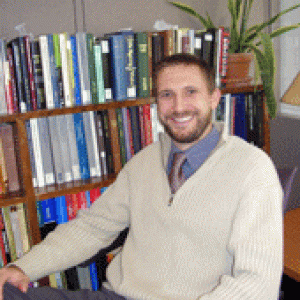Negotiating Religious Pluralism
Resources
According to William Perry’s developmental model, students typically pass through three interpretations of truth claims. At the “dualist” stage, students uncritically adopt knowledge conferred upon them. Truth is truth; all conflicting interpretations are false. At the “relativist” stage, students recognize that perspective bears on every claim. Nothing is true for everyone; every claim or commitment becomes a private matter of taste. Only at the third stage—what Perry calls “commitment in relativism”—do students recognize the relativity of different traditions and perspectives while appreciating the importance of commitment and persuasion.
While Perry’s model helps shape many good pedagogical practices, commitment in relativism most aptly describes the orientation that teachers of writing in particular get their students to construct in and through their written work. Successful academic writing depends on the ability to negotiate the perspectives of other writers and then to construct a new project that both depends on and extends that work. Neither “defending a thesis” over-and-against contrary perspectives (like the dualist), nor naming her or his own “personal opinion” (like the relativist), the nuanced academic writer rather develops projects by negotiating the standpoints of others.
“Negotiating Religious Pluralism” is my best attempt at organizing a course around a series of questions that directly occasion the kind of quality writing projects that I have described above. Course topic and writing assignments are here mutually constitutive. The student’s ability to think through ways in which one might commit oneself to a particular religious tradition while appreciating the beliefs of different traditions dovetails with the ability to extend the work of other authors in his or her own writing. If “negotiating religious pluralism” characterizes both the course topic and the nature of student writing, together they comprise a course whose primary aim is to manifest commitment in relativism within the discursive space of academic writing.
I convey the salient aims of the course in the syllabus by describing three overlapping meanings of “negotiate”: as traversing over unfamiliar ground (that of different religions and interpretations thereof), as managing a problem (largely the problem of relating commitment and relativism), and as the active conferring with others. Allow me to expand on the third. The course as a whole positions academic writing as a process of negotiating with others—other religious practitioners, other writers, and other readers. One of the more distinctive aspects of this course is the number of others involved: The students conducted ethnographies at a Buddhist meditation hall, a Jewish Shabbat service, and a Muslim prayer service. They posed questions to an “interfaith panel” comprised of Duke’s Religious Life staff. They received feedback from an Undergraduate Writing Tutor, who became an ideal “outside reader.” Finally, a collection of the students’ final projects, Religious Pluralism at Duke, was read by members of Religious Life and is now made public through the Duke University Archives.
I also offer an overarching structure (or “narrative”) of the course in the syllabus, explaining that the course progresses through an increasing diversity of texts, by shifting from global to local negotiations, and by assigning writing projects that return to and build upon earlier work. Over the first half of the course, students comprise a series of shorter writing projects in which they isolate and practice the writing “moves” described in Rewriting: How to Do Things with Texts. The first major writing project is a combination, extension, and revision of any number of these earlier projects. Here the students must use published academic texts in various ways to develop a connected and compelling claim about religious pluralism.
The second major writing project asks students to compose an intertextual essay that works between academic and popular texts that differently negotiate the identity of Jews, Christians and Muslims. This project surpasses the previous one insofar as students must here interpret texts that do not necessarily have an “argument.” It builds upon the prior project insofar as students trace the way negotiations change when one moves from global, theoretical material to more popular and local texts. The third writing project asks students to return to their most compelling and contestable earlier projects and revise them in light of interviews, websites, archival material, and religious-life texts here at Duke. This shift enables students to apply the kind of critical analysis they first applied to books to texts with which students are intimately familiar but which they rarely analyze. It also enables them to use writing to participate in local negotiations—to make their writing public in material and influential ways.
If students often oscillate in their writing between “proving” a thesis to be true and offering uncontestable “opinions,” this pendulum swings most widely in courses on religion. Writing about religion appears to many first-year students to be a private affair; to others it becomes a platform to defend eternal truth. Asking my students to negotiate religion pluralism in their writing seems to me to be among the clearest and most compelling ways to reflect on religion through writing that is both generous and assertive, both public and personally engaging, both dependent on others and unique in kind.
